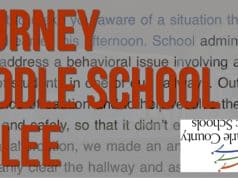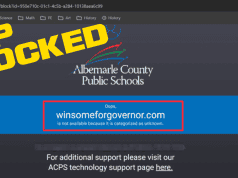 Albemarle County Public Schools (ACPS) and Charlottesville City Schools (CCS) have commenced their annual “sky is falling” budget charade in order to wrangle increased funding from their respective governing bodies and garner (unmerited) public sympathy.
Albemarle County Public Schools (ACPS) and Charlottesville City Schools (CCS) have commenced their annual “sky is falling” budget charade in order to wrangle increased funding from their respective governing bodies and garner (unmerited) public sympathy.
In a January 6, 2011 Daily Progress story on CCS’s purportedly waning finances, Charlottesville School Board member, Juandiego Wade agonized:
“We’re going to have to make some tough decisions.”
Diantha McKeel, Wade’s Albemarle County School Board “chicken little” counterpart, sounded her own fiscal fire alarm in a December 27, 2010 Progress article:
“Certainly, we’re not trying to just cry wolf and get the community excited or upset, but the reality is, somehow or another, we have to come up with a balanced budget. And with these kinds of cuts, we’re looking at significantly affecting our schools and our classrooms.”
McKeel continued:
“We don’t know how deep the hole is going to be.”
In reality, Diantha, the dreaded “hole” may be a figment of your imagination—or an element of your own creation. Based on recent spending proposals, local government schools apparently continue to swim in cash. Reduced class sizes, proposed teacher and staff salary increases, and unnecessary multi-million dollar capital projects are all the rage in Charlottesville City and Albemarle County, courtesy of improvident elected school boards who have not assimilated the nation’s new economic reality.
But wasteful extravagance doesn’t stop there.
Beguiled by captivating electronic “flash and bling,” the two local divisions seem hell-bent on outspending each other in a modern-day techno “arms” race—this regional rush to acquire superfluous technology. And to the victor goes the spoils: bragging-rights to the provincial education high-tech “crown.”
In this immoderate battle-of-the-bucks, we may have a winner in the “most profligate” category. Charlottesville City Schools, despite a desiccated economic environment, has proposed an ostentatious new way to consume excess cash: The Secondary One-to-One Computer Initiative.
Under flimsy cover of the Virginia Standards of Learning, the division is proposing to lease 2,130 new computers—one for each student in grades 6 through 12, and one for each middle and high school teacher—at a jaw-dropping cost of $2.6 million.
Yes, (Charlottesville) Virginia, your elected school board submits that taxpayers—many of whom cannot afford to rub two nickels together, much less a computer for themselves—gift every middle and high school pupil and instructor with their very own, brand spankin’ new laptop.
According to Charlottesville Schools Director of Technology, Dean Jadlowski, the initiative is purposed by, “…the shift to leverage electronic textbooks and online media.”
Not emphasized in the schools’ lopsided internal presentation: the astronomical costs for this “leverage” will be ongoing. Jadlowski projects a four-year replacement cycle for the leased laptops, meaning that at least every four years, taxpayers may be fiscally re-molested by the Charlottesville City Schools in order to procure “replacement” new technology.
Desperate to revive falling enrollment—which has tumbled nearly 20 percent over the past two decades—Charlottesville City Schools secretly implemented a pupil-boosting scheme granting “free tuition” to children of city employees who live outside of the city limits. With the failure of that program to appeal, conceivably CCS administration sees the complementary-computer-for-every-kid-and-teacher policy as a way to bribe reluctant new students (and teachers) into the marginal division, as students (and teachers) will be allowed to bring home “their” taxpayer-purchased laptop computers.
The Albemarle County School Division, meanwhile, has indulged in its own technology binge, as the division in 2010 quietly purchased more than $100,000 worth of iPod Touch devices and accompanying software for its bus drivers!
The “Touch” acquisition was made, perhaps not coincidentally, in the wake of a lawsuit filed last year by county school bus drivers, who alleged they were owed back pay. This incident was considered serious enough that it soon was followed by the untimely “resignation” of Albemarle County Human Resources Director, Kimberly Suyes.
ACPS Communications Coordinator, Maury Brown, described the iPod Touch purchase as a part of “transportation pay reform procedures.”
Brown elaborated on the county’s justification for the expensive technology purchase. Below are her comments, followed by analysis from a former ACPS bus driver:
Brown: They are primarily used as the bus drivers’ time clock — they punch in and out and record what they are doing (pre-route inspection, driving, post-route inspection, washing bus, etc.) on the iPod touch, and the data is uploaded via WiFi when they are at a school or school division building. Previously, drivers had a paper process that required data entry and were allocated a set amount of time for non-driving tasks.
Driver: Routes were computed using VersaTrans, a national program that analyzed routes based upon location and order and geographical placement. VersaTrans accounted for traffic, weather, etc, and usually was accurate to within about ten minutes. My route took three hours in the morning, and three in the afternoon, five days a week. Pre-Trip safety inspections took an additional 15 minutes in the AM and PM, adding 2 hours and 30 minutes per week. Paperwork was calculated at 15 minutes daily, five days a week. So, my route was 30 travel, plus 2.5 hours for Pre-Trip, plus 1.25 hours for record keeping. Add one hour weekly for bus cleaning. Total 34.75 hours weekly. Both driving and non-driving tasks were already factored into the driving equation. No need to punch in or out. No need to be distracted or made late due to technical issues. (Remember, most of the drivers are elderly or less than technically savvy. They are not accustomed to the burden that this will create.)
Brown: In addition to being used as a Pocket Time Clock, the iPod touches also allow drivers to have access to school division email when they are at a school or other Wi-Fi location. This will speed up communication with our drivers and eliminate the need for many paper documents and distribution methods, improving efficiency and reducing costs
Driver: Please?! How much faster can you communicate than to get on the radio and give an all-call to the bus fleet? Don’t forget, we also had the auto call to our phones and e-mail accounts—the same way that parents receive emergency information regarding school closings, etc.
Brown: We do not have an estimate of the cost savings anticipated with using less paper, but will be able to measure at the end of this fiscal year.
Driver: How much cost savings will there be, when the driver, who does not trust the iPod, walks in, after he has been shorted in pay, due either to his inexperience with the iPod, or some other technical issue, and requires an administrator to go back and CORRECT his pay? I would not anticipate a lot of cost savings in the first two years.
Brown: Using the Pocket Time Clocks is expected to save the Division money in its operating budget beginning this year with reduced wage costs. These reforms, along with the redesign of the bus routes for efficiency are expected to save more than $400K in 2010-11.
Driver: You are only saving financial resources IF the system, and ALL of the drivers WORK PERFECTLY. Otherwise, you will see an increase in wage cost, as you pay a human, to investigate, and to correct, either human driver error, a system communication error, or system input error, or perhaps all three. This method that likely will frustrate and anger older, safe veteran drivers to such a degree that they will simply quit. Thus allowing younger, less highway-experienced but technologically savvy drivers to be acquired, at a cheaper rate of pay.
Numerous concerns linger regarding the efficacy of both the CCS and the ACPS technology sprees, but the bigger question is: can local taxpayers afford the extant “drunken sailor” approach to Albemarle County and Charlottesville City school budgeting methodology?
The answer is obvious.
Contrary to Juandiego Wade’s lament, school board members always should have to make tough decisions; that’s part of the job and there should be no quarter for such occasional jeremiads. The comfortable cushion of rising assessments and the jurisdictions’ duplicitous intra-governmental tax-sharing agreements have combined to produce a bloated, reprobate government education establishment—one that immediately must be restrained and then redirected toward fiscal sustainability.









[…] County’s Jack Jouett District Supervisor, Diantha McKeel, has a thing for taxes. From candidate McKeel’s “all choked up” performance in response to a […]